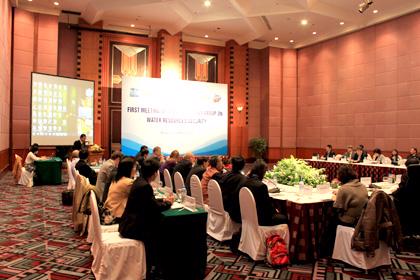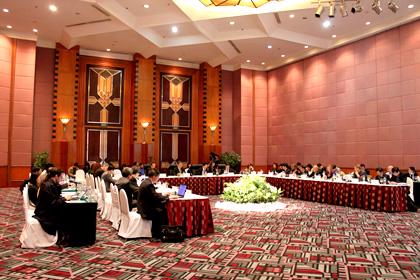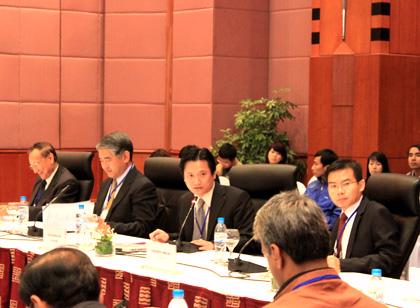

In two days 22-23 March 2011, the Council for Security Cooperation in Asia Pacific (CSCAP) held the First Meeting of the CSCAP Study Group on Water Security in Hanoi under the initiative Diplomatic Academy of Vietnam as a Vietnamese member of the CSCAP.
The meeting gathered a number of scholars and experts on water resources and security in the Asia-Pacific region, focusing on evaluating the actual and current situation of use and management of water resources in the region; the different security impacts water resources’ use and management of the concerned nations; considering the basis of international law and the construction of the international institutions associated with the management and use of water resources.

Overview of the meeting at Melia Hotel - Hanoi
Assessment of the recent situation of water resources in the region, the experts completely agreed that water scarcity is becoming increasingly fierce, water quality is also deteriorating rapidly and water flow changes can also be the greater challenge. Scholar Maria Larsson (Sweden) said that although the current average water level per person in the region has not been too alarming, with the current use and management of water resources in the next 10 years, the region will be in short of water, especially in the Lower Mekong Basin. Many scholars warned that the process of rapid urbanization and industrialization, increasing use of chemical fertilizers in agriculture, and untreated urban wastewater discharging into the rivers are causing the surface and ground water more contaminated. Besides, the construction of eight dams in the Upper Mekong River Basin (China), and 12 dams in the Lower Basin will seriously change the flow of the river, down over 50% of the amount of silt flowing down to Lower Basin, destroying biodiversity in Mekong Basin region and its many implications which cannot be measured all in estuaries (due to not having the scientific research on this issue). Scholar Mark Brindon (Australia) also warned that more water storage for upstream dams increased risk of dams broken in chain in the case of sudden incidents (earthquake), and the catastrophe to the Lower Basin will be much greater than the recent tsunami in Japan.
In terms of security impacts of water issues, most scholars believe that there are many issues to consider. Scholar Tarek Ketensen (International Centre for Environmental Management) said that the dams construction along the Mekong River will have multi-dimensional effects on the interests and security strategy of the regional countries, such as generating hydropower benefits (generated large power output, but only partially met the growing demand in the period 2015-2025, negligible amount compared to the energy needs of the concerned countries); economic benefits (generating the total revenue of 3-4 billion per year and total investment of $ 25 billion in some countries), damaging the environment (segmental and ruined ecological diversity), impacts on food security (losing 3000-4000 tones of fish per year, directly affecting 60 million people living along the river and 300 million people using rice). In addition, the cultural space of the peoples living along the river could be seriously damaged due to habitat changes. He concluded the dams would permanently change the economic space and social culture in the Lower Mekong Basin, and can cause serious conflicts of interest among countries in the region.

Delegates attending the meeting from many countries around the world.
In terms of institutional environment and current cooperation of water resources issues, many scholars believe it is not enough to ensure water security in the region. Scholars emphasize transparency of information on the use of water resources, sharing of data on river flows are things that the countries along the river need to do immediately. Scholars call for China and Myanmar to join the Mekong River Commission soon as the formal members for more efficient cooperation. Chinese scholars said that China's recent legislation has allowed greater transparency about data flow, and China has better coordination with downstream countries, and in the future they will continue to seek more measures to strengthen cooperation with downstream countries. The delegates said that there should be comprehensive and balanced approach to assess the potential benefits and possible harms of the water use projects along the river. George Radosevich, the author of the Mekong Agreement in 1995, emphasizes that the principles of international law in the use of water resources are to ensure the equality among countries along the river, ensuring smooth traffic, equitably divided sharing of resources in the river and not being detrimental to downstream countries. He said experts need to be closely monitoring the use of Mekong water resources for the early warnings of the risks that may occur.

The representatives of Vietnam to attend and comment at the meeting.
Thai scholar stresses the strengthening role of ASEAN in promoting cooperative measures to water resources protections, especially in the process of building a toward-peoples community; bringing the issue of protection of Me-Kong on the ASEAN agenda. Mikiyasu Professor Nakayama (Japan) said that water security issues need to put into discussion at the ASEAN Regional Forum (ARF). The delegate Le Huu Ti of the Socio-Economic Committee Asia Pacific (ESCAP), the United Nations said that the role of ASEAN should be enhanced; ASEAN should at first play a key role in the Water Summit in Asia Pacific held in Bangkok in 2012. Participants also shared ideas of cooperation, such as cooperation to enhance the effectiveness of water use, waste water treatment, cooperation to protect the ecological environment, coping with the impacts of climate change, or sea level rise and the need for the development of less water rice varieties, or mangrove-area rice... Some American and Australian scholars share practical experience of sharing water resources in other areas, given that many lessons can be applied in the Mekong region.
The second meeting of the team will be held in Cambodia in the later 2011, and will focus on areas of specific measures to strengthen international and regional cooperation to better protect water resources.
(according to a press release of the Institute for International Strategy Studies)